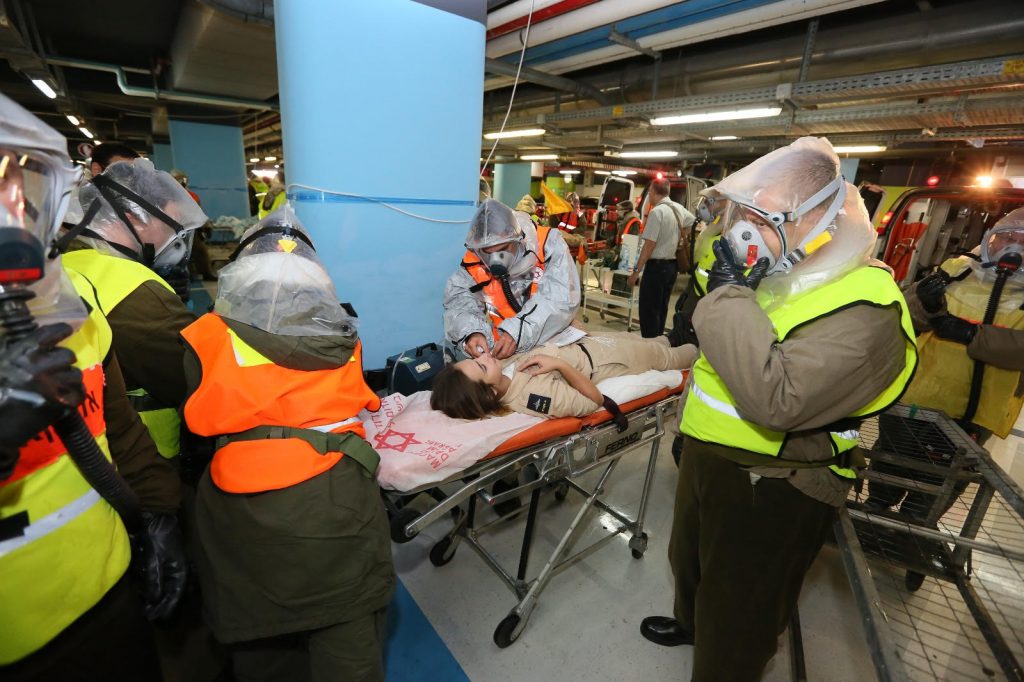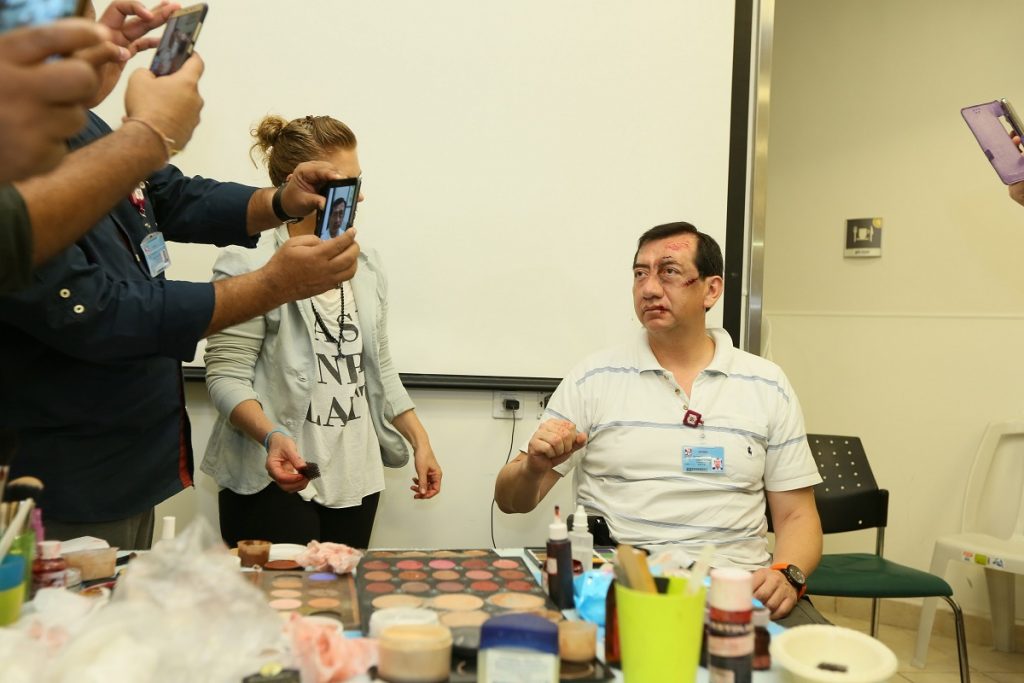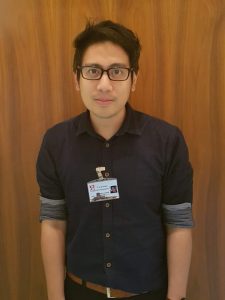Dr. Zhomart Orman, a Kazakhstani physician at the Medical Center Hospital of the President’s Affairs Administration in Astana, always dreamed of visiting Israel, particularly on a learning program. This week, Orman is fulfilling his wish by taking part in a course on Mass Casualty Situations (MCS) co-sponsored by the Rambam Medical Center in Haifa and MASHAV, Israel’s Agency for International Development and Cooperation.
“I dreamed about coming to Israel for a long time. The medicine in Israel is among the best in the world,” Orman tells NoCamels. “I dreamed about seeing the facilities in Israel, seeing how they manage health care service delivery. As far as I know, a lot of injuries and trauma are happening in Israel because of the political situation, conflict and war. The hospitals are well developed, well equipped and the quality and safety of the patients are on the top.”

Dr. Zhomart Orman from Khazakstan is participating in Rambam’s mass casualty training program. Photo by Yaeli Marom
Orman is one of 25 health care practitioners from across the world taking part in the two-week course.
Gila Hyams, Director of the Center for Trauma Training at Rambam, says more than 100 medical personnel applied to take part in the course. The chosen participants hail from Armenia, Belarus, Botswana, Colombia, Ethiopia, Georgia, India, Kazakhstan, Kenya, Macedonia, Malawi, Nepal, Myanmar, Paraguay, Philippines, Serbia, Thailand, and Ukraine.
“Because of Israel’s reality, we have learned how to develop a system of tools, procedures, training, and treatment. We are not teaching medicine. We are sharing our experience, our logistics, and our procedures with this personnel from around the world,” says Hyams.
Israel’s reality and geo-political situation have forced the country to be prepared for every scenario. In the midst of decades of wars and terrorism, Israel developed practical national preparedness policies where “all emergency personnel, health care providers, and medical facilities operate under national policies designed to ensure a swift and coordinated response to any incident, based on an ‘all hazards’ approach that emphasizes core elements commonly encountered in mass-casualty incidents.” This is according to a 2013 study published in Health Affairs by Kobi Peleg, an Israeli professor of emergency and disaster management at Tel Aviv University and the head of the Israel National Center for Trauma & Emergency Medicine Research at Gertner Institute, and Bruria Adini, head of the master’s program in the Emergency Medicine Department at the Recanati School of Community Health Professions at Ben-Gurion University of the Negev, and a former head of the Emergency Hospitalization Department in the Ministry of Health (MOH).
According to the study, Israel mandates “compulsory emergency response training for all medical institutions and first responders and regular exercises for responding to mass-casualty incidents.” The country’s expertise has been sought out in the aftermath of a number of terror incidents across the world, including 2013’s bombing of the Boston Marathon.
In Israel, Rambam serves as a center for treating severe trauma and complicated medical patients, Hyams tells NoCamels. The hospital cooperates with the Israel Defense Forces and Magen David Adom and is a referral center for district hospitals.
“We have a very specific Torah of how to deal with a variety of mass casualty situations. Because of Israel’s past wars, the threats from neighboring countries, missile attacks, terrorism, we have tens of years’ experience. Even in times of peace, we are always modernizing and training for different situations. You never know when a mass casualty trauma will happen,” Hyams explains. “It is our responsibility to be prepared.”
For Hyams, it is also a central responsibility to share this knowledge of how best to treat victims of road accidents, combat arenas and terror attacks.
“Medicine is an international language, and wherever we go, we translate the knowledge accumulated in Rambam and Israel to save lives. From year to year, we see how the interest in our course is growing, and the pride is to see our graduates return to their countries of origin and apply everything they learned here, for the welfare of the inhabitants of their home countries,” she says.
During their course in Israel, participants learn about the preparedness of hospitals and emergency rooms in Israel for Mass Casualty Situations (MCS), triage in MCS, the role of nurses, effects of blasts, dealing with biological, chemical, and radiological MCS, the structure and logistics of Rambam’s Fortified Underground Hospital, how to manage deceased victims, medical advances in trauma care, and pediatric training for MCS.
Sign up for our free weekly newsletter
SubscribeOver the years, more than 500 decision-makers and field personnel in the field of trauma — from 61 countries — have completed Rambam’s international trauma courses. The particular course is one of dozens developed by Rambam for medical teams from across the world.
In Bangkok, Dr. Chirakit Hengrasmee, an emergency physician, works at the 900-bed Vajira Hospital. Seeing the 2,000-bed Sammy Ofer Fortified Underground Emergency Hospital at Rambam was an experience he’s not soon likely to forget.
“I have read about the underground hospital in Israel. This is the most exciting for me — to see this underground hospital,” says Hengrasmee of the facility in Haifa.
“To be honest, I thought there was only one medical center but we’re traveling around Israel and we’re seeing other clinics. I like that there are courses at several medical centers,” Orman says, while attending a lecture at Beilinson Hospital in Petach Tikva. “You do not only get to know about the medicine or health care but also about the culture in a hospital.”
Hyams says that if Israel “can help these international medical personnel implement life-saving treatments” in their countries, then society is better for it.
“We’re all at risk of a terrorist attack,” she tells NoCamels. “If we know how to save lives, then we’re helping one another.”
The participants cite Israel’s dedication and professionalism in the medical and trauma field and say they’re impressed by the way Israelis want to help.
“Israel is a role model for many countries around the world, especially in Thailand,” says Hengrasmee.
“Rambam truly believes that this knowledge that we have collected over the years does not belong to us. We learned through loss of life and we’re saving lives through sharing this information,” Hyams concludes.
Viva Sarah Press is a journalist and speaker. She writes and talks about the creativity and innovation taking place in Israel and beyond. www.vivaspress.com
Related posts

Editors’ & Readers’ Choice: 10 Favorite NoCamels Articles

Forward Facing: What Does The Future Hold For Israeli High-Tech?

Impact Innovation: Israeli Startups That Could Shape Our Future






Facebook comments